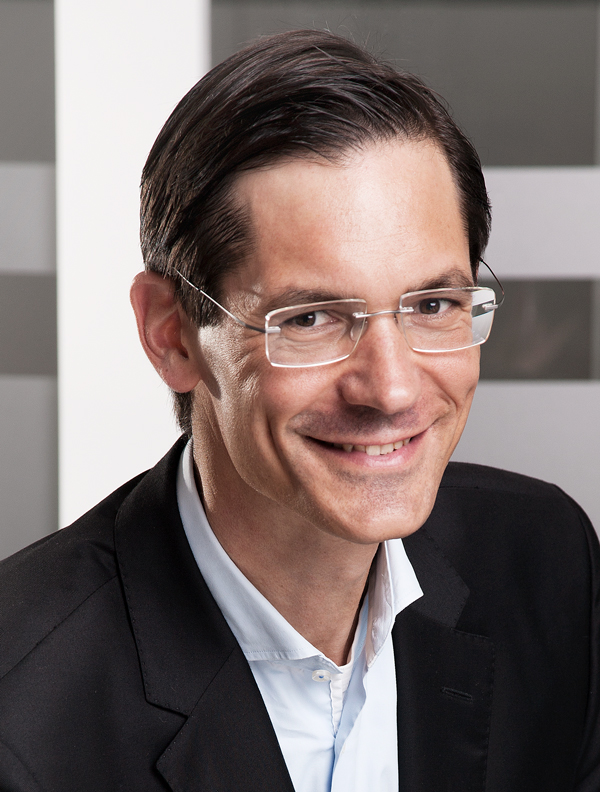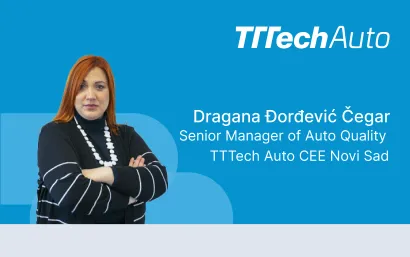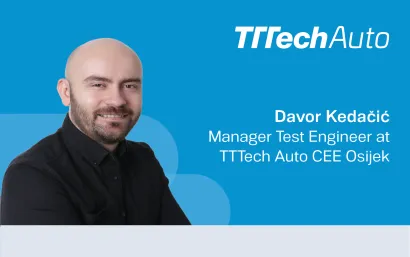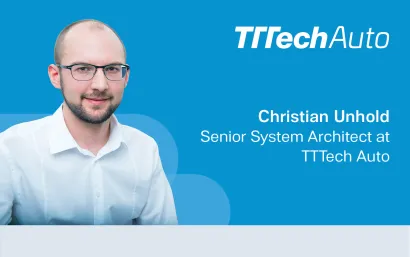The automotive industry is evolving at the speed of light and reveals many opportunities
In the June edition of the Expert Talks interview series with Georg Kopetz, we explored TTTech Auto’s journey to support OEMs and Tier 1 suppliers. TTTech Auto helps them to achieve the highest levels of automation in their driverless programs by delivering safety software platforms that allow for a seamless shift towards future mobility concepts. In this edition, we will continue the dialogue with Georg Kopetz and discuss how TTTech Auto is approaching the changing collaboration styles across the automotive industry, as well as the importance of opportunities unlocked by building fit-for-purpose ecosystems focused on advancing autonomous driving mobility.
The automotive industry is reinventing itself; what changes caused by this shift are you encountering today?
The automotive industry is undergoing a very important transition. Although software has been an important element since the first introduction of ECUs in the 1970s, until now it has always been only an “engineering” part of many different distributed ECUs and was therefore never priced separately. Provided by Tier 1 suppliers as a black box, it was considered as a part of the hardware system cost, specifically a development cost, rather than a product cost. Therefore, it appears as if software was only entering the automotive industry now. Today, generic, yet sophisticated, high-performance computing hits the market, and with this hardware comes a technological readiness and capability to tackle automation use cases. Thus, software is becoming much more important. It enables OEMs to move away from hardware appliances dedicated to perform only one function to a generic hardware platform that has built-for-purpose software functions running on top of a powerful middleware to achieve the required automation levels.
Did having software pushed to the forefront of the industry evolution change the rules of the game in any considerable way?
This evolutionary leap has changed the cooperation models considerably, even opening the space for new roles to emerge within the automotive industry. An example of this is the role of software Tier 1 or Tier 1.5 suppliers (in close partnership with system Tier 1s) that are bringing market-ready, platform-centric software solutions to OEMs, and also help them to integrate the software functions running on top of the platform. This is exactly the role that we see TTTech Auto fit into perfectly, as we leverage all our key competences. As a neutral player in the industry, we can, as a software Tier 1 or Tier 1.5 supplier, support our customers better and guide them on the journey to full automation.
What does being a software Tier 1 or Tier 1.5 supplier mean to TTTech Auto?
As a software Tier 1 or Tier 1.5 supplier, we are perfectly positioned to help not only OEMs, but the different hardware Tier 1 and the system Tier 1 suppliers as well. They are providing sensors, actuators and even complete systems that contribute different functions that have to work together and have to be integrated on top of the middleware software platform. This software-defined paradigm shift is certainly affecting the changes we see in the market, since software brings another dimension to the market. SCRUM and other agile development practices, which are entering the automotive landscape from the traditional IT and software industry, are introducing new ways of developing software and also a different speed of development.
These agile practices were not a standard in the automotive industry before?
Software companies have more experience with fast and efficient development styles than traditional automotive companies. However, it is the automotive companies that build safety- and mission-critical solutions and thus usually engage in more traditional, conservative practices to meet the high safety criteria. At the same time, it is very important for the automotive industry to blend those two worlds – the safety-critical and the agile practices - and to keep the best of both. This way, companies can deliver upon strict safety requirements, as well as make use of the speed and flexibility that has become a requirement in the market due to software introduction. It is necessary to build a more structured, process-driven approach, as it was done in the safety-critical industries, by adding certification, but also by capitalizing on software companies’ agile, sprint oriented and very flexible working style. This will allow the whole automotive industry to better adapt to the changing landscape and to leave the strict, inflexible structures of the past behind for good. However, safety needs a clearly defined and anchored process and at TTTech Auto we are in the optimal position to bridge the safety-critical requirements and the agile practices.
Are there any other collaboration efforts that can ease the transition into this new software-defined era in the automotive industry and deliver better results?
The next major element is the topic of establishing ecosystems. We have already examined how the collaboration styles across the automotive industry are changing. The way forward is the establishment of dedicated ecosystems that will empower all players to deliver more relevant value through open collaboration styles. As opposed to the partnership style, where one supplier and one customer cooperate to solve one specific challenge, the set-up of an ecosystem opens the possibility of tapping into many different competencies and capabilities brought by different players, who can solve a variety of challenges much faster and in a more efficient way. Covering ground from every perspective, this kind of collaboration will enable the industry to bring out safe and reliable highly automated cars and mobility services. We will closely examine this topic at this year’s Peter Drucker Forum in November, in Vienna, where TTTech Auto will be hosting a round table about establishing the right fit-for-purpose ecosystems.
What initiatives are out there to accelerate the journey forward for building such ecosystems across the industry?
In order to meet the challenge of building the right ecosystems, the autonomous mobility industry must come together to show serious efforts in ensuring and prioritizing safety on all levels, as well as to set common technical and legal standards. An initiative that we helped to launch to address this topic and to advance autonomous driving in a safe and reliable way is The Autonomous. The Autonomous event was held at the Hofburg in Vienna on September 5, 2019. The Autonomous is designed to bring together top executives and experts of the autonomous driving industry. In four workshops (Safety & Architecture, Safety & Security, Safety & AI and Safety & Regulation), experts discussed the complex topic of a global safety reference. Our customers and partners, as well as the major thought leaders in the industry gathered to discuss the topic of safety in automation and autonomous driving and the establishment of a global safety reference. For us to reach this goal, we support The Autonomous in building the most influential global community to advance safe autonomous mobility by bringing together many different players, like OEMs, semiconductor vendors, Tier 1 software disruptors, governments, cities, insurance companies and legislators to build a complete ecosystem, where experts can open up a dialogue and clearly discuss challenges, as well as provide solutions to these challenges in a pre-competitive environment. The event was a huge success and was received very well by all stakeholders.
Are there other ways in which TTTech Auto has contributed to the change of collaboration styles?
Another milestone that illustrates our contribution to this advancement in collaboration is Audi and Aptiv winning the prestigious Automotive News PACE award in the category of “Innovative Partnership”, which recognizes its innovative way of cooperation with partners on the zFAS platform. zFAS is the central driver assistance controller specifically targeted at automated driving use cases. It bundles the management capabilities of many driver assistance systems’ software functions in one highly integrated domain-driven architecture. Audi worked on the zFAS program together with hardware supplier Aptiv, as well as TTTech Auto as a safety software platform supplier. TTTech Auto was also responsible for integrating applications on top of the platform for Audi and establishing a sound integration process. With this, TTTech Auto established the blueprint for future collaborations. See the full article. We have learnt a lot from this new way of collaboration with Audi and were able to integrate our experience into our products. This helped us to be recognized in the industry as a neutral supplier and a pioneer in new, innovative business models. We look forward to driving forward these types of collaborations and the efforts to build ecosystems, because we believe that all players in the automotive industry benefit from the accumulated know-how and experience that become available with these initiatives.

| About the ContributorGeorg Kopetz is Co-founder of TTTech Auto. He studied law at the University of Vienna and has comprehensive professional experience in the financial and legal field, having worked as a finance and law consultant in Austria and abroad. |
Accelerate your journey towards highly automated driving with MotionWise safety software platform. MotionWise delivers safety by design and fail-operational performance while managing the high complexity of solution elements. As a result, OEMs and Tier 1 suppliers can benefit from faster time-to-market for their automated driving projects and increased competitive edge at reduced costs.
Stay informed about the most recent technological findings in the automotive industry - visit us at www.tttech-auto.com and follow us on LinkedIn for more on this exciting topic.


